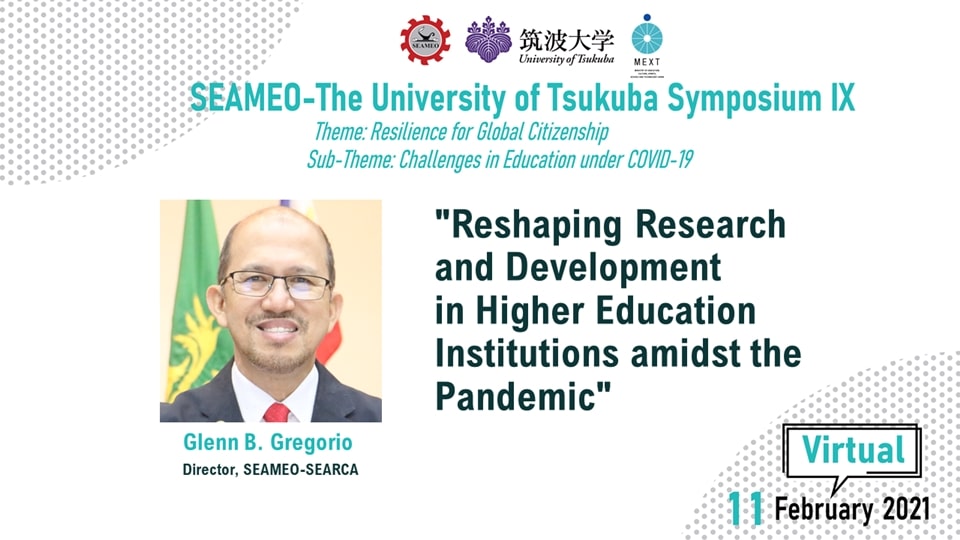Underscoring the role of higher education institutions (HEIs) to produce a transformative mindset that disrupted global citizenship education (GCED) and further resulted in far-reaching social and economic changes, Dr. Glenn B. Gregorio, Director of the Southeast Asian Regional Center for Graduate Study and Research in Agriculture (SEARCA), tackled the GCED’s positive effects in understanding the growing complex social concerns now and even more in the future.

The Southeast Asian Ministers for Education Organization (SEAMEO) Secretariat (SEAMES), in collaboration with the University of Tsukuba and supported by the Ministry of Education, Culture, Sports, Science and Technology (MEXT) Japan, convened the 9th SEAMEO-University of Tsukuba Symposium held online on 11 February 2021.
The symposium aimed to provide a platform to showcase the best practices of education responses to the pandemic and school closures in the region; identify opportunities and challenges faced by schools in Southeast Asia during the pandemic period; consolidate the policy changes and ways forward for new normal in education; and identify ways to address the needs of disadvantaged students learning through remote education.
Among the invited keynote speakers, Dr. Gregorio discussed how SEARCA reshapes research and development in HEIs. Moreover, he highlighted that the health crisis has expanded the role of HEIs in GCED not in instruction but also as engines of social inclusion.
“The contribution of the universities to society is measured both by its impact on higher education and research and the extent to which it bridges social and cultural interaction between itself and the community it aims to serve and improve,” said Dr. Gregorio.
He also added that HEIs have become key institutions for meeting the Sustainable Development Goals (SDGs) which are global challenges faced by humanity and the planet.
With its 11th Five-Year Plan focused on Accelerating Transformation through Agricultural Innovation (ATTAIN), SEARCA commits to contribute and allocate resources for the achievement of SDG 2 - Zero Hunger, SDG 4 - Quality Education, SDG 9 - Industry Innovation and Infrastructure, SDG 13 - Climate Action, and SDG17 - Partnerships. The Center also aims to tangentially contribute to SDG 1 - No Poverty, SDG 5 - Gender Equality, and SDG 12 - Responsible Consumption and Production.
Participants of the symposium composed of educators and school administrators were also informed of their role to invest more on contributions to society that has large impact on GCED and research and the extent to which it bridges social and cultural interaction between itself and the community.
“Two of the most vital tasks for universities are addressing disparities between the wealthiest and the poorest and the crucially changed balance between the planet and mankind, where population growth and human activity have negatively influenced the habitability of the earth,” the SEARCA Director added.
Dr. Gregorio emphasized that universities can potentially lead the way in developing a sustainable and responsible pathway to address the current challenges in the agricultural and rural development (ARD) landscape. Moreover, universities should ensure that their offerings are relevant to the changing times; they should be flexible enough to delete, revise, and institute new course offerings not just to keep up with the current challenges the community is facing but also to anticipate such complexities of the pandemic.
Other keynote speakers include Prof. Dr. Nakao Nomura of University of Tsukuba; Dr. Zulhamsyah Imran of the SEAMEO Regional Centre for Tropical Biology (SEAMEO BIOTROP); and Dr. Songheang Ai of the SEAMEO Regional Centre for Technical Education Development (SEAMEO TED). Dr. Wahyudi, SEAMES Deputy Director for Programme and Development, moderated the panel session.